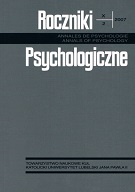Powodzenie w kształceniu integracyjnym a wybrane zmienne psychospołeczne - weryfikacja modelu teoretycznego
Efectiveness of inclusive education and selected psychosocial factors - verification of a theoretical model
Author(s): Grzegorz Wiącek, Andrzej E. SękowskiSubject(s): Psychology
Published by: Towarzystwo Naukowe KUL & Katolicki Uniwersytet Lubelski Jana Pawła II
Keywords: inclusive education; effectiveness; psychosocial correlates
Summary/Abstract: There is still too little research done in the field of inclusive education. Effectiveness is one of important characteristics of this kind of education, research on which can lead to its’ organisational and practical improvement. In this article a verification of the theoretical model of correlates of effectiveness in inclusive education is presented. The model is based on a system approach to inclusive education’s effectiveness, and there are three areas of potential correlates included in the model – the class environment, the family environment, and the pupil’s person. Our study undertaken to verify the model covered 13 inclusive classes. Pupils, teachers and parents were all included in this research. The results provide supporting empirical evidence for the system approach in measuring effectiveness of inclusive education, as well as its correlates. The obtained empirical model was found to comprise all aspects of the effectiveness concept and all areas of its factors assumed in the theoretical model. However, not all of the assumed psychosocial variables turned out to be significant correlates of the effectiveness.
Journal: Roczniki Psychologiczne
- Issue Year: 10/2007
- Issue No: 2
- Page Range: 89-111
- Page Count: 23
- Language: Polish

